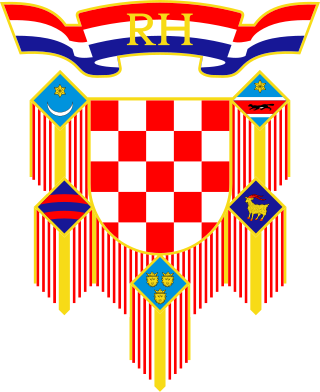The politics of Croatia are defined by a parliamentary, representative democratic republic framework, where the Prime Minister of Croatia is the head of government in a multi-party system. Executive power is exercised by the Government and the President of Croatia. Legislative power is vested in the Croatian Parliament. The Judiciary is independent of the executive and the legislature. The parliament adopted the current Constitution of Croatia on 22 December 1990 and decided to declare independence from Yugoslavia on 25 May 1991. The Constitutional Decision on the Sovereignty and Independence of the Republic of Croatia came into effect on 8 October 1991. The constitution has since been amended several times. The first modern parties in the country developed in the middle of the 19th century, and their agenda and appeal changed, reflecting major social changes, such as the breakup of Austria-Hungary, the Kingdom of Serbs, Croats and Slovenes, dictatorship and social upheavals in the kingdom, World War II, the establishment of Communist rule and the breakup of the SFR Yugoslavia.

The president of Croatia, officially the president of the Republic of Croatia, is the head of state, commander-in-chief of the military and chief representative of the Republic of Croatia both within the country and abroad. The president is the holder of the highest office in Croatia. However, the president is not the head of the executive branch as Croatia has a parliamentary system in which the holder of the post of prime minister is the most powerful person within the country's constitutional framework and everyday politics.

The Croatian Parliament or the Sabor is the unicameral legislature of Croatia. Under the terms of the Croatian Constitution, the Sabor represents the people and is vested with legislative power. The Sabor is composed of 151 members elected to a four-year term on the basis of direct, universal and equal suffrage by secret ballot. Seats are allocated according to the Croatian Parliament electoral districts: 140 members of the parliament are elected in multi-seat constituencies. An additional three seats are reserved for the diaspora and Croats in Bosnia and Herzegovina, while national minorities have eight places reserved in parliament. The Sabor is presided over by a Speaker, who is assisted by at least one deputy speaker.

The Croatian Democratic Union is a major conservative, centre-right political party in Croatia. Since 2016, it has been the ruling political party in Croatia under the incumbent Prime Minister Andrej Plenković. It is one of the two major contemporary political parties in Croatia, along with the centre-left Social Democratic Party (SDP). It is currently the largest party in the Sabor with 55 seats. The HDZ governed Croatia from 1990 before the country gained independence from Yugoslavia until 2000 and, in coalition with junior partners, from 2003 to 2011, and since 2016. HDZ is a member of the Centrist Democrat International, International Democracy Union, and the European People's Party, and sits in the European People's Party Group in the European Parliament. HDZ is the first political party in Croatia to be convicted of corruption.

The Social Democratic Party of Croatia is a social democratic political party in Croatia. The SDP is anti-fascist, progressive, and strongly pro-European. The SDP was formed in 1990 as the successor of the League of Communists of Croatia, the Croatian branch of the League of Communists of Yugoslavia, which had governed Croatia within the Socialist Federal Republic of Yugoslavia since World War II.

The Croatian Peasant Party is an agrarian political party in Croatia founded on 22 December 1904 by Antun and Stjepan Radić as Croatian Peoples' Peasant Party (HPSS). The Brothers Radić believed that the realization of Croatian statehood was possible within Austria-Hungary, but that it had to be reformed as a Monarchy divided into three equal parts – Austria, Hungary and Croatia. After the creation of Kingdom of Yugoslavia in 1918, the Party requested for the Croatian part of the Kingdom to be based on self-determination. This brought them great public support which culminated in 1920 parliamentary election when HPSS won all 58 seats assigned to Croatia.

The Croatian Social Liberal Party is a conservative-liberal political party in Croatia.

The Croatian People's Party – Liberal Democrats is a social-liberal political party in Croatia.
Regular elections in Croatia are mandated by the Constitution and legislation enacted by Parliament. The presidency, Parliament, county prefects and assemblies, city and town mayors, and city and municipal councils are all elective offices. Since 1990, seven presidential elections have been held. During the same period, ten parliamentary elections were also held. In addition, there were nine nationwide local elections. Croatia has also held three elections to elect members of the European Parliament following its accession to the EU on 1 July 2013.

Nin is a town in the Zadar County of Croatia.

Count Károly Khuen-Héderváry de Hédervár, born as Károly Khuen de Belás was a Hungarian politician and the ban of the Kingdom of Croatia-Slavonia in the late nineteenth century. Khuen's reign was marked by a strong magyarization. After a series of riots broke out against him in 1903, Khuen was relieved of his duty and appointed prime minister of Hungary.
The People's Radical Party was a populist political party in Serbia and later Yugoslavia. Led by Nikola Pašić for most of its existence, its ideological profile has significantly changed throughout its history, shifting from socialism and radicalism towards conservatism in the early 20th century.

Zoran Milanović is a Croatian politician who has been serving as the president of Croatia since 2020. Prior to assuming the presidency, he was the prime minister of Croatia from 2011 to 2016, as well as the president of the Social Democratic Party (SDP) from 2007 to 2016.
Parliamentary elections were held in the Kingdom of Croatia-Slavonia from 19 to 22 May 1897. The People's Party emerged as the victor.
The Yugoslav Muslim Organization was an Ethnic Muslim political party in the Kingdom of Serbs, Croats and Slovenes, later in the Kingdom of Yugoslavia. It was founded in Sarajevo on the 16 February 1919 and was led by Mehmed Spaho. The party was a successor of Muslimanska Narodna Organizacija, a conservative Bosniak party founded in 1906 during the Austro-Hungarian era. The Muslim National Organization was itself a successor of the conservative Bosniak "Movement for waqf and educational autonomy" that goes back to 1887. In election campaigns the JMO did mobilize on religious slogans rather than Bosniak nationality, calling failure of Muslims to vote for the party as a sin. The party had considerable influence in Islamic religious institutions, and JMO came to dominate the political life in Bosnia and Herzegovina. The party appealed to Muslims throughout Yugoslavia, urging them not to migrate to Turkey.

The 1886–87 United States Senate elections were held on various dates in various states. As these U.S. Senate elections were prior to the ratification of the Seventeenth Amendment in 1913, senators were chosen by state legislatures. Senators were elected over a wide range of time throughout 1886 and 1887, and a seat may have been filled months late or remained vacant due to legislative deadlock. In these elections, terms were up for the senators in Class 1.

The Serb National Council is an elected political, consulting and coordinating body which acts as a form of self-government and autonomous cultural institution of the Serbs of Croatia in matters regarding civil rights and cultural identity. The council's main focuses are human, civil and national rights, as well the issues of Serbs of Croatia identity, participation and integration in the Croatian society. Since 2000 the council is a member of the Federal Union of European Nationalities.

European Parliament elections were held in Croatia on 26 May 2019, electing members of the national Croatia constituency to the European Parliament. These were the third such elections in the country since its accession to the European Union in 2013.
The 1887 New South Wales colonial election was for 124 members representing 74 electoral districts. The election was conducted on the basis of a simple majority or first-past-the-post voting system. In this election there were 35 multi-member districts returning 87 members and 37 single member districts giving a total of 124 members. In the multi-member districts each elector could vote for as many candidates as there were vacancies. 13 districts were uncontested. This was the first election at which there were recognisable political parties. The average number of enrolled voters per seat was 1,984, ranging from Boorowa (1,103) to Canterbury (3,161).
There were special elections in 1887 to the United States House of Representatives to the 49th United States Congress and the 50th United States Congress.













